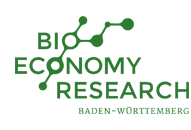Analysis of the profitability and the acceptance among farmers of perennial lignocellosic crop production in Baden-Württemberg
In a future bio-based economy biomass production from agriculture will be increasingly important as a resoucre for new materials. In this context, perennial lignocellulosic crops, like short rotation coppice (SRC) or miscanthus, could become more interesting farming activities. However, the cultivation of SRC and miscanthus is not yet widespread because of different reasons, such as a low profitability.
Aim of this sub-project was to investigate the attitude of the farmers in Baden-Württemberg towards the cultivation of SRC and miscanthus. For this purpose, surveys including a choice experiment were conducted in the regions identified as most suitable for the cultivation of these perennial crops. The suitability of the regions was determined by site-specific profit-ability and stochastic risk analyses.
In total, 117 farmers in the regions Unterland/Gäue, Rhein/Bodensee and Bauland/Hohenlohe were surveyed. The results show that the utility of the cultivation of SRC and miscanthus ceter-is paribus is valued negatively. If no guaranteed purchase contracts are given to the farmers, they will expect compensation payments or higher contribution margins, which clearly exceed the opportunity cost of land and the capital cost. In average, farmers expect compensation payments of € 460 and € 400 per hectare and year for SRC and miscanthus.
It is noteworthy that guaranteed purchase contracts for the harvest reduce the compensation demand by around € 420 per hectare. Moreover, the in average expected contribution margin will decrease by around € 120 per hectare, if colleagues in the neighborhood already cultivate SRC and miscanthus. Thus, we conclude that there is no general aversion to these crops. In principle, the farmers behave rationally. This is also corroborated by the fact that the amount of the initial investment negatively affects the cultivation of SRC and miscanthus. Furthermore, the probability that farmers optain for a perennial crop decreases with an increasing variability of the contribution margin. However, the latter also holds for the usually cultivated crops.
For both farming activities analyzed and for the attributes used in the choice experiment a significant preference heterogeneity among the respondents was found. Thus, there is a considerable range in the utility perception of the perennials, which translates into a relatively large range of implicit compensation demands.
From the results it can be deduced that guaranteed purchase contracts can be an important tool for supporting the cultivation of SRC or Miscanthus. The establishment of lignocellulosic clusters, in which growers and processing companies are concentrated, could be a way of promoting these new crops without using direct subsidization.
| Project title | Agro-economic analysis of production processes for lignocellulose-containing biomass and their acceptance in agriculture in Baden-Württemberg |
| Institution | University of Hohenheim, Institute of Farm Management |
| Research group | Prof. Dr. Christian Lippert, Dr. Tatjana Krimly, M.Sc. Caroline Janas |
| Project status | completed |
